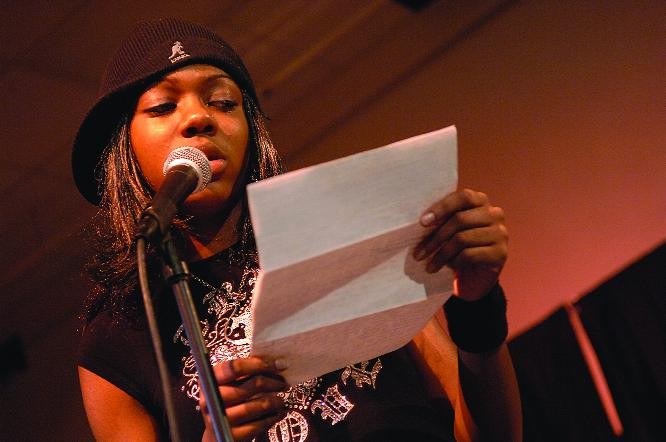
Nahketah Hamilton reads a tribute to university student David Ellis, her close friend who died in a Knox Box fire at the beginning of the semester.
“I am who I say I am and God knows it. I am a poet. One Love,” said award-winning playwright Kymone Freeman, as he finished reading a selection from his play Prison Poetry.
When the doors opened to the first Juke Joint of the semester last night, students poured into the multipurpose room of the Nyumburu Cultural Center. The one-hundred some chairs set up for last night’s event were filled within minutes and droves of students posted themselves against the walls or sat on the floor.
What began as a small event nearly 10 years ago for students to come together and showcase their performance talents has become a monthly tradition for more than a dozen minority student groups and aspiring artists such as Freeman.
Fashioned after early 1920s club scenes that served as a home for music and other performances, Juke Joint originally started as a program called “Third Thursdays,” said Kesha Jamaal, assistant director of student involvement for the Nyumburu Cultural Center. During the mid-1990s, “Third Thursdays” allowed students to gather and perform, play cards and listen to music.
Today, Juke Joint remains an alternative to other social events, but as the Nyumburu Cultural Center grew, so did this tradition of sharing talent among students, said Jamaal, who graduated from the university in 2000.
Nyumburu, which sponsors the event, asks different student organizations to host Juke Joint each month in an effort to attract more students.
Black Greek letter organizations Iota Phi Theta, Delta Sigma Theta, Sigma Gamma Rho and Omega Psi Phi hosted last night’s Juke Joint. The groups named the event “Black Love Edition,” a Valentine’s Day and Black History Month-inspired theme that also featured students’ poetic tributes to senior David Ellis, who died last month in an off-campus fire.
In addition to providing students an outlet to display their talent, Jamaal said, “We wanted to give students an alternative to going out and drinking.”
But Jamaal added Juke Joint also provides leadership roles for students who may not be heavily involved with student activities.
One of these students was alumnus Jason Reynolds, whose name became arguably synonymous with Juke Joint during his time at the university.
“I wasn’t really into school,” Reynolds said, though he concedes, “I did OK.”
“Not every student is talented academically,” said Reynolds. Some students are talented artistically and they just need a place to showcase that.”
Reynolds said his first Juke Joint experience was in the mezzanine level of Nyumburu (read: a hallway) in which about eight students performed original poetry.
“It would just be a couple of people vibing and sharing their poetry,” Reynolds said. But after about a year, Juke Joint really took off, which Reynolds believes was due in part to a decrease in funding for black student organizations such as the Black Student Union.
“[Juke Joint] became like the black event for everybody to come to.”
Today, Jamaal said, 15 to 20 students perform original poetry, hip-hop, spoken word or other artistic talents at each event. The program also features a DJ, a spoken word or musical artist and a live band, which Jamaal said was her way of adding “more culture and texture to the event.”
Juke Joint is also a way for university staff to connect with students, said Kellea Tibbs, a resident director in Hagerstown Hall who has performed regularly at Juke Joints since coming to the university a year and a half ago.
“It’s good for [students] to see staff doing the same thing they’re doing. They see you as a regular person, not just as an authority figure.”
Juke Joint days behind him, Reynolds is doing more than “OK.” A resident of Brooklyn, N.Y., he just released his third poetry book and is currently writing children’s books. For Reynolds, Juke Joint served as a “practice platform.”
“When I was at Maryland, [Juke Joint] was my pedestal … my soap box,” he said.
Whether it’s the music, the spoken word or just the vast presence of students, it’s clear Juke Joint brings about a sense of solidarity, even among strangers.
And so it’s appropriate that this installment of a time-honored tradition begins with the phrase “One Love.”
Perhaps that’s the reason behind everyone leaning the same way when the DJ spins Busta Rhymes’ “Touch it” – and why everyone stands up and cheers when one musician trumpets his way through the crowd to serenade a young woman in the audience.
And perhaps it explains how a performance turned into a sharing of souls as two young women used their poetry to say goodbye to a dear friend and beloved member of their community. As tears ran down the performers’ cheeks and they paused to gather their composure, the silence in the room was not uncomfortable, but warm with the shared artistic compassion of one love.
Contact reporter Bethonie Butler at butlerdbk@gmail.com.



